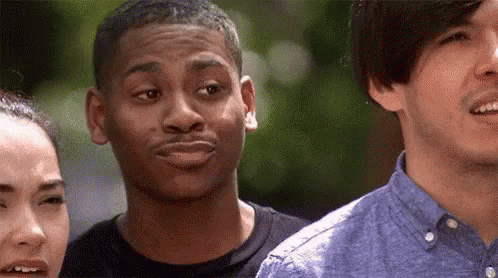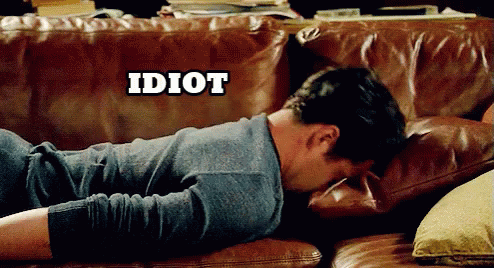Ruling Autism In or Out
Have you ever been presented with a scenario in which you questioned every single moment of your life? I think reflecting on specific moments or aspects are fairly common, but is it even possible to reconsider every memory?
When I was 19 years old,
I started wearing glasses. I didn’t get an injury to prompt it, I just hadn’t talked to a doctor. I’m pretty sure that could be the title of my autobiography. “I Hadn’t Talked To a Doctor: The Simple Answer to All My Problems.”
I, of course, have talked to many doctors throughout my life. Unfortunately, I have a tendency to leave out information. While talking to the doctor I’ll sit there thinking “I got weird pain in my knee at the gym this morning, but I only told them I was here because of this cough. I don’t want to make it weird so I’ll wait for the doctor to ask me if anything else is wrong. Oh, they never did. Guess I’ll just keep living with this weird knee pain. It’ll probably go away.”
Or, when it came to ophthalmologist visits, I would outright lie.
My lies were never done with ill intent. In fact, I was so racked with guilt during all my vision tests that I made very specific decisions regarding when I would lie and how often. For example, I wasn’t going to intentionally say the wrong letter in the first two lines. That’d be ridiculous. Who can’t see the giant “E?”
However, a few errors on the 4th and 5th lines don’t seem too egregious. As long as it’s a similar letter, of course. Maybe I’ll say “P” when I see an “R.” Or vice versa. If none of those appear, I’ll switch around an “O, “C,” or “G.” If I pull it off right, maybe I can give just enough wrong answers to convince them to give me glasses.
Again, I must reiterate how guilty I felt through this entire process. So much so that I still remember sitting in the nurses office, teacher’s lounge, or library of my elementary school over the years and trying to decide what was the limit before they would think there was a serious problem. So the first time I decided I was going to risk eternal damnation for a pair of glasses, I only lied a couple of times.
This wasn’t enough.
The next test, I threw a couple more in. Next test, a few more. But I always stopped myself before I went too far. I had this fear that they would know what my eyes could really see and would get mad at me for lying. This is the type of ludicrous thinking that only an imaginative child who doesn’t understand the limitations of both modern science and the average adult’s commitment to their job would have.
They didn’t care, I was one of hundreds of kids they were seeing that day and just needed to get the tests done. Furthermore, they had no idea if I was lying or not. That’s why they were asking me what I saw. Stupid, young me.
The worst part is, I could have just asked my mom for non-prescription glasses. She probably would have said no, but if I knew that was a possibility I definitely would have taken asking and getting turned down over lying so many times.
I know what you’re thinking: Ryan, you were born in 1989. Glasses didn’t become fashionable or cool until the mid-naughts. Why go through all this effort to just be called names?
It’s quite simple: my best friend wore glasses and he was the coolest person I knew. Still ranks pretty highly up there to this day. Glasses or not. I wanted to do everything he did. Kids already saw me as weird, what would the addition of glasses do to my non-existent reputation?
On the bright side, the Fates had my back because in middle school I noticed that things were blurry. Yippee.
But only in a highly specific situation. If I was sitting at the back of the room and the teacher was using a pre-printed transparency on an overhead projector, everything was too blurry to read.
[Yes, I said “overhead projector.” Take a moment to get over your nostalgia for getting called up to the front of the room to be blinded when you accidentally looked directly into a lightbulb, just so you could write on a thin piece of plastic that slid with the marker, which you would then try to erase with the spray bottle and that disgusting ball of used-to-be-brown paper towels that was forever moist, and were then once again blinded by the lightbulb as you went back in to write your answer on a piece of plastic that was now smeared with the same color as your marker, making what you wrote illegible. I’ll wait for you here in 2022 where we’ve rightly moved on.]
After I mentioned this occasional vision issue to my mother, she got an eye test set up and I finally achieved my childhood dream of having glasses. Very exciting.
But not so fast, these glasses were only meant for use with the overhead projector, not all the time. This was made extremely clear by my mom who must have told me no less than 5 billion times between the LensCrafters and the car to “Don’t ever take them out of their case unless you absolutely need them. You better not break them.”
And being the type of kid I was, I listened. That’s right, my lifelong goal of being made fun of for wearing glasses finally achieved and I don’t wear them because my mother says “don’t.” I was that kid. Follow the rules to a T, regardless if I liked them or not.
What finally changed my wearing of glasses from “only when needed” to “all the time,” was seeing a doctor again where I was given a new rule to follow.
I moved from Austin to Atlanta after high school and no longer knew how to get around. It became apparent rather quickly that I couldn’t actually read any of the street signs until it was almost too late to slow down.
As the responsible human being that I am, I said to myself “I think I may need to wear glasses when I’m driving. Good thing I have glasses.” Which I proceeded to not wear because my immediate next thought was “what if the prescription for overhead projectors is different from the prescription needed for street signs? Better not risk it.”
A few months later, (because there’s no way it was going to be in a reasonable time frame even after telling myself “I can’t see very well when driving, that seems dangerous”) I went to the local mall and got a new prescription. I was told I could wear these glasses anytime. So I did.
Sometime in the next two years, a friend and I were throwing a tennis ball around when I realized that I could see the direction of the spin. “That’s weird,” I thought. “I’ve never noticed how a ball was spinning before. This must be some special training tennis ball with wider lines.”
In high school I benchwarmed baseball. Referring to my time on the team as “played” would be an insult to my peers. I was not very good. Multiple errors, terrible hitter, the baseball would miss my glove and hit me in the face and/or chest when playing catch more often then I would care to admit.
I had always been guessing where the ball was going. That’s just what I thought everyone did and that some people were better at it than others. There was even a moment where our coach was telling the team about how he wasn’t very good until he got glasses and could finally see the spin on the ball. And yet, I still kept my “overhead projector only” glasses in the my backpack in the locker room.
Let’s call the entire glasses saga “Exhibit A.” Or maybe “Exhibit G” since the letter “A” is not used on eye charts.
When I was 21 years old,
I realized that I had ADHD. Don’t get this misconstrued, I wasn’t diagnosed; I realized it.
As a student under the umbrella of education majors, I had to take a few generic, base level classes on teaching. In one of these classes we were given a bulleted list of attributes that students with ADHD can demonstrate and it was as if I was reading the Spark Notes of my entire educational experience.
That afternoon I asked Rachel if she got the same list in her section of the course. She looked me straight in the eyes and said, “Yup.” I asked her if it reminded her of anyone.
She didn’t break eye contact and said, “Yup.”
Completely unaware to the social cues, I said, “Who? I thought it sounded a lot like me.”
“Yup.”
And with this new information I thought about all the forgotten homework assignments, my unwillingness to study, how there always seemed to be a missing step when I was working out math equations. It was always there. In fact, it was still there. One of the reasons I switched away from a biochemistry major after my 2nd year in college was because I found myself struggling in the required math classes.
I took this information and I immediately went to the doctor.
No I didn’t. Of course I didn’t. You knew before you even got here that I didn’t. That would solve all my problems, so of course I put it off for a decade.
I continued to put it off when,
at the age of 26,
I was getting certified to teach Gifted and Talented students and the instructor used me as an example of a textbook GT student. I had to inform her that I was, in fact, not GT. In 6th grade I did some test to try and get in the gifted classes at my school, but didn’t make the cut.
She was stunned. I was stunned that she was stunned.
She then mentioned that I must have something else masking it. “Well, you see, five years ago I realized I probably have ADHD,” I said confidently.
“You should go see a doctor about that,” she helpfully suggested.
“Yeah, definitely.”
I did not.
We shall combine both the ADHD and the GT saga above and refer to them as “Exhibit Go See a Doctor When You and/or Others Notice an Issue.”
When I was 31 years old,
Inspired by my wife’s annoyance at me forgetting instructions regarding the care of our newborn son, I finally sought out a psychologist to get tested for ADHD.
Those who have read my blog post “Nothing Livens Up the Night Quite Like an Existential Crisis,” know that the psychologist’s testing came back as unusable and inconclusive. The ADHD testing they were capable of was very basic and only focused on ADHD. She said that there could be something else masking it, but identifying that would require more advanced testing that they were not capable of.
Deja vu.
She didn’t say what any of those others things could be, but on the bright side we were able to rule out anxiety, trauma, and depression. (Which, apparently, can all present with the same symptoms as ADHD. How this wasn’t reiterated to me every year as a teacher when I was handed a stack of IEPs worries me.)
Six months later, I finally got off the waiting list and met with a neuropsychologist. The testing was similar to what I did with the psychologist, but more. Much more.
While I spent roughly 6 hours in total with the psychologist, I spent closer to 25 or 30 hours working with the neuropsychologist. There were general discussion meetings, in-depth, open-ended questionnaires, “how well does this apply to you” multiple choice questionnaires, logic puzzles, trivia questions, reading tests, some more questionnaires. It was a lot.
I was mentally drained for weeks, but I knew all the work wasn’t in vain. Throughout the process, the doctor and his assistant made multiple comments that results were already showing the presence of ADHD. Their goal was to figure out what else was there.
In my head, I figured that the GT instructor from 6 years earlier was somehow correct and I was, in fact, gifted. The giftedness masked the ADHD and the ADHD masked the giftedness. Simple. Easy. Check and check. Let’s talk about how I can move forward to utilize both talents to their fullest.
Just to be thorough, the doctor wanted to also test me for any learning disabilities and autism. Cool. Let’s do it. It will be good to add those to the list of things that it’s not.
Further back in my head, I think I’d known for awhile that it wasn’t going to be as simple, but I wasn’t going to believe it until I saw the data to support it. Every time I looked at the list of attributes that apply to autistic adults, only about half of them seemed to apply. And those half also applied to ADHD. That was how I justified not actually considering it without evidence that slapped me in the face.
I think the neuropsychologist recognized my apprehension early on when in the first five minutes of me talking about why I think I have ADHD in our first meet-and-greet video call he said, and I quote, “I can tell from the shelf of figures behind you that you have autism.”
“That’s a weird shot for a doctor to take at me for liking Funko Pops,” I thought as I chuckled aloud. “Funny, sure. But weird.”
The man wasn’t roasting me. He was making a professional observation. People with ADHD don’t tend to have pristinely organized and displayed bookshelves. As a test, he asked me to knock some of them over on camera to see how long I could leave them there without fixing them. I did and left them like that for about a week.
That helped to rule out OCD.
I still didn’t fully acknowledge the reality of what was going on.
It’s weird. I wouldn’t have described myself as having had a bias against autism at the time, but the word clearly carried a negative connotation in my mind. For me, it was something to be ashamed of. I don’t know if it’s because I feared how others would perceive me or how I would perceive myself, but there was a definite bias.
But then, 2 hours and 45 minutes into the 3 hour video call where we were reviewing all of my test results, autism had not been mentioned once.
I was officially diagnosed with ADHD and informed that I am, in fact, gifted. Apparently, this last bit wasn’t just obvious to that one GT instructor years earlier, but every single person in my life that I’ve talked to since I got the diagnosis. Everyone just thought I already knew.
I did not. I always knew I was fairly smart and had a quick wit, but I just assumed it was because I liked trivia games and watched a lot of “Whose Line Is It Anyway?” I never once considered my intelligence to be particularly unique. Definitely not “very superior” unique.
Or as my wife like to call it “sub-genius.” Thanks for keeping my self-esteem in check.
Around the 2 hours and 55 minute mark of this meeting, when I thought the doctor was getting ready to bid me farewell, he instead opened another folder. It contained 13 previously unseen documents and was simply titled: “Ruling Autism In or Out.”
“In here are all of the answers that you gave, your wife gave, your test data, and other observations I made that relate to autism. All of this data is an incredible reflection of the last 14 years of your life. But that’s not enough. Autism isn’t autism unless it has always been there. I need you to go through these documents with someone who has known you longer than your wife has and then get back to me.”
About a week later, I got on a Zoom call with my mom and spent 4 hours going through every single document, line-by-line. She was far more skeptical of the entire possibility than I was, which is saying something. In her defense, she was born in 1952 and autism only became its own separate diagnosis in 1980. When she thought of autism, she thought of kids who are non-verbal or incredibly socially-awkward. Neither of which describe me.
I had to remind her that there were layers to all of this and if she could remember any story that stood out when compared to my older brothers, she should tell me. For example, a kid can be a bit of a perfectionist or a procrastinator and not be autistic. However, if their 6th grade science fair project is due tomorrow and almost finished, but the kid has a meltdown because it doesn’t look like what they want it to: that’s probably autism.
“Well there was this one time…”
Of course, one incident doesn’t make it autism either. We need a history of events over the entire lifetime.
By the time we got to the last document, we were still pretty unsure. So many of the items could be chalked up to ADHD or a kid just being a kid.
Then, suddenly, it hit us both like a ton of bricks and we knew.
When I was 18 years old,
I un-enrolled from high school a few months before the end of my senior year due to severe digestive issues. I had to finish up my last remaining credits needed to graduate through a home-school, self-paced, computer software program. While I was unable to walk at graduation, I did get my diploma with the summer graduates.
I’d always had slight digestive issues, but this was the first time they were a hindrance on my day-to-day life. Gastroenterologists tested me for everything they thought a teenager with no medical history could have. When all that came back negative, they began testing for the “it doesn’t make sense that you would have this but let’s look anyways” conditions. I was tested for IBS, diabetes, Crohn’s, parasites, cancer, ulcers. I had ultrasounds, colonoscopies, x-rays, blood work.
I tracked my meals to look for allergies, tried removing different foods from my diet, took more vitamins, less vitamins, various over the counter medicines, tried a few sessions with acupuncture. Some short term successes occurred with each change, but those were just as likely to be a placebo effect than anything actually affective.
After many months and many tests, the only thing I found that helped continuously was medicine for acid reflux. I didn’t actually have acid reflux, but it was helping and all the other tests came back negative so the doctor was more than happy to write a prescription for Nexium and call it a day.
Fourteen years later, my mother and I are staring in silence at this document with a section titled “Digestive Issues.”
When I was 32 years old,
I was diagnosed with level 1, functioning autism and my entire life instantly clicked into place. How no one saw it sooner now baffles me. In fact, you can see it in every story in this post above. Almost every memory of mine has a moment that I now see in a new light.
Prone to follow rules to a fault? Check.
Resistant to change? Check
Procrastination? Perfectionism? Conflict avoidance? Check. Check. Check.
Honesty? Well, not so much in the above. But I did feel guilty about it, and would generally consider myself to be overly honest.
Misses social cues? Big check. One of the tests I had to do was to watch videos of amateur actors over-act conversations and then identify what emotion they were showing. I did terribly. Whenever they had a neutral reaction, which is supposed to be the easiest to get, I would apply an emotion. When I told Rachel about this she said, and I quote, “I thought I was the crazy one.”
Not the best way to respond while I’m trying to come to terms with the realization that I have a mental disorder, but I understand the sentiment and thank her for putting up with me.
I’m sure she isn’t the only that has felt that way at some point when interacting with me. All those times I misinterpreted a response, didn’t understand when a joke was done, blurted something out bluntly without thinking, became so set in my viewpoint of an event that I couldn’t see another perspective.
All the daily interactions I have with humans where I don’t initiate the conversation. Which is closely followed by the daily interactions I have with humans where I don’t know when the encounter is finished and it is an appropriate time to walk away.
Having known my whole life that I was (and am) a bit weird and tended to only keep a small group of very close friends throughout my youth. Even when the general group of friends that I belonged to became larger in high school, I still only felt like a few of them would consider me a friend. I recognize that this thinking is probably a result of my inability to read social cues combined with my low self-esteem to draw negative conclusions, but knowing that now doesn’t change the memory. It simply makes it a “I wonder if…”
On the other hand, I can probably thank autism for what I consider my best qualities. Quick wit? Unique sense of humor? Creative thinking? Ability to problem-solve? High attention to detail? Quality work? All autistic traits.
In retrospect, the reason I was a great teacher was because of my autism. No worksheet or lesson I was given or found online was ever up to my standards, so I created the vast majority of my lessons. Even when another teacher gave me a lesson to use, I would recreate almost every aspect of it. I would retype entire worksheets and slideshows just to modify a single piece of information, adjust the layout, or add/remove some lines of space for writing. This was all usually done at the last minute (aka before school started), which had the added benefit of allowing me to change it to fit the exact needs of my students that day.
My tendencies to be more introverted meant that I didn’t want to be the center of attention, so my classroom routine was designed to be student-lead. I utilized timers throughout each segment of those lessons so that I wouldn’t lose track and could stay focused.
Of course, this also meant that I was incredibly strict regarding student behavior. To be honest, I don’t think I necessarily disliked being the super-strict teacher or would/could change anything if I went back. But maybe now that I know more about my brain some situations would play out differently.
There were definitely times where I now know that I experienced sensory overload from the noise and my brain would struggle to function. This would lead to me becoming completely overwhelmed and getting angry. It’s easy now to see those moments for what they were, but at the time my mind read the situation as “these students are not listening and I need them to just stop so I can think.”
I’ve done a lot of reflecting over the last few months. It’s hard not to after getting any of these diagnoses, let alone all three. If only the ADHD, giftedness, or autism were identified before I graduated high school, I honestly don’t think that my life would be what it is now. I wouldn’t end up in Atlanta for college. I wouldn’t have switched my major to education or history. It’s possible I still could have met my wife since we met through a mutual friend that I already had in Atlanta, but I highly doubt we would have ever dated.
This is about as far as I got in the rapidly approaching complete mental breakdown that came after I got my diagnosis report before it stopped. Once I got to thinking about Rachel, none of the other stuff seemed to matter. The struggles I had as a student, all the “you’re lazy” or “not living up to your potential” comments from the adults in my life, the low-paying career choice, the decades of student debt in my future, having to explain to people where Kennesaw State University is whenever I mention my alma mater (just outside Atlanta, btw). All inconsequential.
You see, something else occurred while reviewing all of the data, information, and anecdotes the neuropsychologist had collected from me and Rachel. After every document he would reference all of the strategies that he would “normally recommend” to his patients at this point. Strategies such as using a shared calendar with those I live with, keeping to-do lists, verbalizing thoughts and feelings, writing down any important information in a designated location so it was easily accessible, asking for clarification when needed. All of which Rachel suggested, encouraged, or outright forced me to implement long before I turned 30.
In fact, the only reason I even began the process of getting tested for ADHD when I did was because of all the support she gave me. Without them, the rest of my day-to-day life would be such a struggle that I would continue postponing anything related to my health.
During that final review session the doctor diagnosed me with one last thing: having one of the most supportive and understanding spouses he has seen.
Life’s pretty good here.





